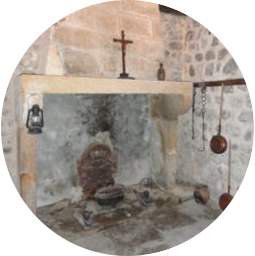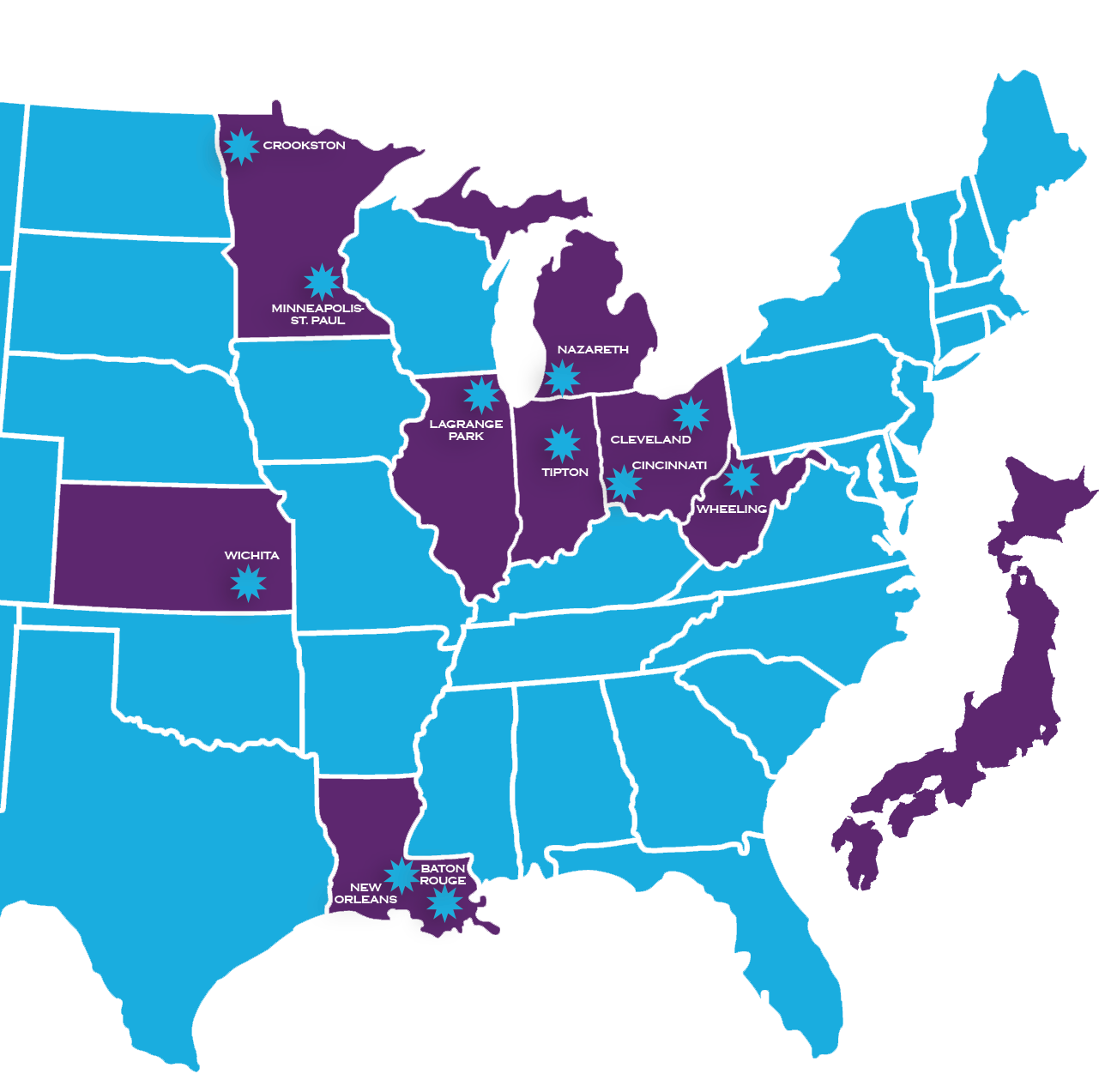 The Sisters of St. Joseph began with six women meeting in small kitchen in LePuy, France in 1650. These six women had a common desire to grow in their love of God and serve the unmet needs of the people around them, whom they came to call their “dear neighbors.” These women, with the spiritual direction of a Jesuit priest, Jean Pierre Medaille, formed the first community of Sisters of St. Joseph. These sisters lived simply and among the people, rather than behind cloistered walls as was the norm for women religious of the time.
The Sisters of St. Joseph began with six women meeting in small kitchen in LePuy, France in 1650. These six women had a common desire to grow in their love of God and serve the unmet needs of the people around them, whom they came to call their “dear neighbors.” These women, with the spiritual direction of a Jesuit priest, Jean Pierre Medaille, formed the first community of Sisters of St. Joseph. These sisters lived simply and among the people, rather than behind cloistered walls as was the norm for women religious of the time.
 Over the next century, the Congregation experienced rapid growth in France, until it disbanded during the civil and religious unrest of the French Revolution. Unwilling to renounce their religious freedom, many of the sisters, led by Jeanne Fontbonne (Mother St. John Fontbonne), were imprisoned or forced into hiding where they lived as dedicated lay women. In 1807, the Cardinal of Lyons asked the remaining sisters to establish a foundation in his city.
Over the next century, the Congregation experienced rapid growth in France, until it disbanded during the civil and religious unrest of the French Revolution. Unwilling to renounce their religious freedom, many of the sisters, led by Jeanne Fontbonne (Mother St. John Fontbonne), were imprisoned or forced into hiding where they lived as dedicated lay women. In 1807, the Cardinal of Lyons asked the remaining sisters to establish a foundation in his city.
Coming to the United States
Under the direction of Mother St. John, seven sisters journeyed from France to America in 1836 to work with deaf children in St. Louis at the invitation of the Bishop of that city. From there, new communities of Sisters of St. Joseph were formed throughout the United States and Canada, including the seven founding communities which make up our Congregation of St. Joseph. They are Cleveland, Ohio, Wichita, Kansas, LaGrange Park, Illinois, Wheeling, West Virginia, Nazareth, in Kalamazoo Michigan, Tipton, Indiana, and Medaille which includes New Orleans and Baton Rouge, Louisiana, Cincinnati, Ohio, and Crookston and Minneapolis-St. Paul, Minnesota.
Today
As Sisters of St. Joseph in the 21st century, we continue to respond to the unmet and critical needs of our contemporary society and world. Our mission and vision, informed by a deep and pervasive love of God and neighbor without distinction, move us always toward ways to respond, in a spirit of unifying, reconciling love, to the needs of our local communities, the call of the Church, the people of God, and the challenges of the global community within which we live. Today, our areas of presence include:
CLEVELAND, OHIO
Our History
In 1872, three sisters including Mother St. George Bradley came to the Cleveland Diocese to serve as teachers at St. Mary, Painesville, where the first Cleveland “house” was founded. Through Mother St. George Bradley's vision, the Cleveland Congregation began.
In 1898, the Cleveland Congregation headed further north in Ohio, when Mother Theresa Fitzmaurice purchased property on a dirt road in the wilderness on the far west side of the city of Cleveland. On these grounds, two buildings were constructed: a motherhouse for the growing community and a boarding school for boys and girls.
In 1905 the present motherhouse, St. Joseph Convent, was built. In 1929 Saint Joseph Academy was built. Saint Joseph Academy is now one of our sponsored ministries. In 2007, the Cleveland founding community joined with our other 6 communities to form the Congregation of St. Joseph.
Today
St. Joseph Convent is now known as St. Joseph Center, which also serves as the Congregation’s central office. The building houses both retired and actively ministering sisters, administration offices, the St. Joseph Worship Space, and River's Edge spirituality, conference and retreat center. Beginning in the fall of 2017, a new home for our Cleveland sisters and River’s Edge will begin construction on the property, to be completed sometime in 2018. Saint Joseph Academy will renovate and adapt the current building to extend it’s campus and provide additional classroom space.
WICHITA, KANSAS
Our History
In 1883, Mother Stanislaus Leary of Rochester, New York, stopped in Kansas en route to Arizona. At the urging of Bishop Louis Mary Fink, Order of St. Benedict in Leavenworth, she went on to Newton and later to Concordia, where she established a motherhouse. In 1886 Sister Bernard Sheridan of the Erie, Pennsylvania, congregation joined the new congregation in Concordia. In the summer of 1887, Bishop Fink asked Mother Stanislaus to send sisters to Abilene, Kansas, to staff St. Andrew parochial school and to build an academy. Mother Stanislaus sent Sister Bernard along with five other sisters in May of 1888.
In December 1899, Bishop Hennessy negotiated the purchase of land and a building in east Wichita. Mother Bernard, who in response to diocesan authorities came to Wichita in 1900, accepted the deed to the property and the congregation occupied the building on March 25, 1900. This was the fourth motherhouse of the congregation and was to become its permanent home. Bishop Hennessy brought the sisters to Wichita to staff the parochial schools of the diocese.
The scope of congregational ministry has not been limited to the United States.
In 1950, the congregation responded to the need for medical services in Kyoto, Japan. Three sisters began a mission which today sponsors a kindergarten, day nursery, medical services for senior citizens, a disabled children's hospital, a special education school and retreat opportunities. In 2007, the Wichita founding community joined with our other 6 communities to form the Congregation of St. Joseph.
Today
In response to our changing needs, construction is underway on a new home for sisters which will be a non-profit senior care property and will offer sisters and others assisted living and skilled care options. The building will have 20 assisted living apartments and 24 skilled care units and be an addition to the existing 32 apartment independent living complex known as Joseph Villa. The new building will be an addition to the campus which includes Mount St. Mary’s Convent and the chapel. Anticipated completion of the building will be in the Fall of 2017. The new building will be managed by CSJ Initiatives.
LAGRANGE PARK, ILLINOIS
Our History
The story of the Sisters of St. Joseph in LaGrange Park began with Mother Stanislaus Leary, who was general superior of the Concordia (Kansas) foundation until 1899. After her death in 1900, Archbishop Feehan of Chicago named Sister Alexine Gosselin her successor. As Mother Alexine, she faced the daunting task of shepherding a new congregation whose financial resources totaled 33 cents.
Mother Alexine gratefully accepted contributions from parishioners to open a school for girls, grades 1-12. She rented a house large enough to accommodate both students and sisters. Classes began in September 1900 with 14 students, six of whom were residents. They paid $10 per month. The eight-day students paid 50 cents. From the beginning, the school offered a comprehensive Christian education based on sciences and letters, with an emphasis on art and music.
By 1912, there were 80 Sisters in the Congregation. Responding to an invitation from Bishop Thomas Grace, Mother Bernard Gosselin, Mother Alexine’s own sister, left with a number of sisters to found a community in California that now is known as the Sisters of St. Joseph of Orange, who established thriving ministries in education and health care.
Following WWI and WWII, the congregation prospered and fulfilled requests from parishes to staff their schools. By 1960 the Sisters’ education ministry served more than 14,000 elementary and high school students. In 2007, the LaGrange Park founding community joined with our other 6 communities to form the Congregation of St. Joseph.
Today
While at one time most of our sisters served in education, today our ministries are as varied as our members themselves. Using our diverse talents and gifts, we respond to the needs of the world, serving as educators, nurses, social workers, spiritual directors, and parish and hospital chaplains, touching the lives of more than 20,000 children and adults annually. Currently, a new home for our sisters in LaGrange Park is being constructed which will offer assisted living care options, and portions of the existing building will be renovated for The Well Spirituality Center, other ministries, and administrative office. The new building will be managed by CSJ Initiatives.
WHEELING, WEST VIRGINIA
Our History
In the early 1853, Bishop Richard Vincent Whelan, first Bishop of Wheeling, requested sisters to aid in the work of his new diocese. Four sisters arrived in Wheeling on April 13, 1853 to care for patients in the newly established hospital. In May of that year two more women joined the other sisters. These six sisters formed the nucleus of the Sisters of Saint Joseph of Wheeling. On May 4, 1860, the Wheeling community was made an independent Congregation by Bishop Whelan. In 2007, the Wheeling founding community joined with our other 6 communities to form the Congregation of St. Joseph.
Today
Our sisters in Wheeling continue to serve the people of West Virginia by reaching out through a variety of ministries, and through support of local initiatives. Using our diverse talents and gifts, we respond to the needs of the world, serving as educators, nurses, social workers, spiritual directors, parish and hospital chaplains, and more, going always wherever the need may be.
NAZARETH, MICHIGAN
Our History
In 1889, the first Sisters of St. Joseph arrived in Kalamazoo, Michigan and established the congregation of Sisters of St. Joseph of Nazareth. The founding sisters came to Kalamazoo at the request of the Diocese of Detroit and Msgr. Francis O'Brien for the purpose of establishing a hospital, later named Borgess Hospital. At about the same time these first sisters, under the leadership of Mother Margaret Mary Lacy, began an orphanage and a school in addition to establishing their motherhouse at Nazareth on the outskirts of the city of Kalamazoo.
In 2007, the Nazareth founding community joined with our other 6 communities to form the Congregation of St. Joseph.
Today
Over the years, the congregation expanded throughout Michigan and our ministries grew to include health care, social work, education, parish ministry, spiritual development, pastoral ministry, and ministry with those who are elderly, homeless, or dying. Currently, a new home for our sisters in Nazareth is under construction behind the existing building, which will better meet our changing needs and provide assisted living care options. Transformations Spirituality Center will also be housed in the new facility, which should be completed in 2017.
TIPTON, INDIANA
Our History
A young Sister Gertrude Moffitt, accompanied by two companions, answered the call from St. John the Baptist Parish in Tipton, Indiana, in 1888. From the small, humble cottage in which they lived, the Sisters of St. Joseph of Tipton, Indiana, established a vibrant presence in the area. Mother Gertrude, the foundress of the community, was a visionary who laid a foundation of strength upon which all future sisters in Tipton could build. Throughout their time in Tipton, the sisters were led by women of courage and vision. In 2007, the TIpton founding community joined with our other 6 communities to form the Congregation of St. Joseph.
Today
Although the property on Division Road in Tipton was sold to the Diocese of Lafayette in 2016, many sisters still live and minister in the area, while others have relocated to our other centers. The presence and history of our sisters from the founding community of Tipton lives on through their ministries and through the powerful impact they have made and are still making wherever they live.
MEDAILLE
Our History
Sisters from Bourg, France, first came to the United States in 1854 to Bay St. Louis, Mississippi. Establishing a central house in New Orleans, Louisiana, the Sisters extended their ministry to the poor and suffering of Louisiana and Mississippi, opening schools, hospitals and an orphanage.
Sisters from the New Orleans group went to Cincinnati, Ohio, in 1893 to care for the needs of the working girls in Sacred Heart Home, a boarding residence which came to be known as the Fontbonne. In time, the sisters also undertook educational and other apostolic ministries in Ohio.
The year 1903 saw six sisters dispatched from Bourg, France to staff a school in Argyle, Minnesota. Two years later a school and convent were begun in Crookston, Minnesota. The sisters soon staffed educational and health care institutions throughout the area, extending their presence in Minneapolis/St. Paul, and to Wisconsin, North Dakota, and Canada.
On November 30, 1977, Rome officially declared the Sisters of Saint Joseph of Medaille. The name Medaille was chosen because it is the family name of the Jesuit priest, Jean-Pierre Medaille, S.J., who helped found the Sisters in 1650. The sisters were geographically located in the north, central and southern areas of the United States.
Today
In 1986 and in 1994 decisions were made to merge the three provinces into five regions - Baton Rouge, Cincinnati, Crookston, New Orleans, and the Twin Cities. In 2007, the Medaille founding community joined with our other 6 communities to form the Congregation of St. Joseph.
MEDAILLE
Our History
Sisters from Bourg, France, first came to the United States in 1854 to Bay St. Louis, Mississippi. Establishing a central house in New Orleans, Louisiana, the Sisters extended their ministry to the poor and suffering of Louisiana and Mississippi, opening schools, hospitals and an orphanage.
Sisters from the New Orleans group went to Cincinnati, Ohio, in 1893 to care for the needs of the working girls in Sacred Heart Home, a boarding residence which came to be known as the Fontbonne. In time, the sisters also undertook educational and other apostolic ministries in Ohio.
The year 1903 saw six sisters dispatched from Bourg, France to staff a school in Argyle, Minnesota. Two years later a school and convent were begun in Crookston, Minnesota. The sisters soon staffed educational and health care institutions throughout the area, extending their presence in Minneapolis/St. Paul, and to Wisconsin, North Dakota, and Canada.
On November 30, 1977, Rome officially declared the Sisters of Saint Joseph of Medaille. The name Medaille was chosen because it is the family name of the Jesuit priest, Jean-Pierre Medaille, S.J., who helped found the Sisters in 1650. The sisters were geographically located in the north, central and southern areas of the United States.
Today
In 1986 and in 1994 decisions were made to merge the three provinces into five regions - Baton Rouge, Cincinnati, Crookston, New Orleans, and the Twin Cities. In 2007, the Medaille founding community joined with our other 6 communities to form the Congregation of St. Joseph.
MEDAILLE
Our History
Sisters from Bourg, France, first came to the United States in 1854 to Bay St. Louis, Mississippi. Establishing a central house in New Orleans, Louisiana, the Sisters extended their ministry to the poor and suffering of Louisiana and Mississippi, opening schools, hospitals and an orphanage.
Sisters from the New Orleans group went to Cincinnati, Ohio, in 1893 to care for the needs of the working girls in Sacred Heart Home, a boarding residence which came to be known as the Fontbonne. In time, the sisters also undertook educational and other apostolic ministries in Ohio.
The year 1903 saw six sisters dispatched from Bourg, France to staff a school in Argyle, Minnesota. Two years later a school and convent were begun in Crookston, Minnesota. The sisters soon staffed educational and health care institutions throughout the area, extending their presence in Minneapolis/St. Paul, and to Wisconsin, North Dakota, and Canada.
On November 30, 1977, Rome officially declared the Sisters of Saint Joseph of Medaille. The name Medaille was chosen because it is the family name of the Jesuit priest, Jean-Pierre Medaille, S.J., who helped found the Sisters in 1650. The sisters were geographically located in the north, central and southern areas of the United States.
Today
In 1986 and in 1994 decisions were made to merge the three provinces into five regions - Baton Rouge, Cincinnati, Crookston, New Orleans, and the Twin Cities. In 2007, the Medaille founding community joined with our other 6 communities to form the Congregation of St. Joseph.
MEDAILLE
Our History
Sisters from Bourg, France, first came to the United States in 1854 to Bay St. Louis, Mississippi. Establishing a central house in New Orleans, Louisiana, the Sisters extended their ministry to the poor and suffering of Louisiana and Mississippi, opening schools, hospitals and an orphanage.
Sisters from the New Orleans group went to Cincinnati, Ohio, in 1893 to care for the needs of the working girls in Sacred Heart Home, a boarding residence which came to be known as the Fontbonne. In time, the sisters also undertook educational and other apostolic ministries in Ohio.
The year 1903 saw six sisters dispatched from Bourg, France to staff a school in Argyle, Minnesota. Two years later a school and convent were begun in Crookston, Minnesota. The sisters soon staffed educational and health care institutions throughout the area, extending their presence in Minneapolis/St. Paul, and to Wisconsin, North Dakota, and Canada.
On November 30, 1977, Rome officially declared the Sisters of Saint Joseph of Medaille. The name Medaille was chosen because it is the family name of the Jesuit priest, Jean-Pierre Medaille, S.J., who helped found the Sisters in 1650. The sisters were geographically located in the north, central and southern areas of the United States.
Today
In 1986 and in 1994 decisions were made to merge the three provinces into five regions - Baton Rouge, Cincinnati, Crookston, New Orleans, and the Twin Cities. In 2007, the Medaille founding community joined with our other 6 communities to form the Congregation of St. Joseph.
MEDAILLE
Our History
Sisters from Bourg, France, first came to the United States in 1854 to Bay St. Louis, Mississippi. Establishing a central house in New Orleans, Louisiana, the Sisters extended their ministry to the poor and suffering of Louisiana and Mississippi, opening schools, hospitals and an orphanage.
Sisters from the New Orleans group went to Cincinnati, Ohio, in 1893 to care for the needs of the working girls in Sacred Heart Home, a boarding residence which came to be known as the Fontbonne. In time, the sisters also undertook educational and other apostolic ministries in Ohio.
The year 1903 saw six sisters dispatched from Bourg, France to staff a school in Argyle, Minnesota. Two years later a school and convent were begun in Crookston, Minnesota. The sisters soon staffed educational and health care institutions throughout the area, extending their presence in Minneapolis/St. Paul, and to Wisconsin, North Dakota, and Canada.
On November 30, 1977, Rome officially declared the Sisters of Saint Joseph of Medaille. The name Medaille was chosen because it is the family name of the Jesuit priest, Jean-Pierre Medaille, S.J., who helped found the Sisters in 1650. The sisters were geographically located in the north, central and southern areas of the United States.
Today
In 1986 and in 1994 decisions were made to merge the three provinces into five regions - Baton Rouge, Cincinnati, Crookston, New Orleans, and the Twin Cities. In 2007, the Medaille founding community joined with our other 6 communities to form the Congregation of St. Joseph.
Test
tweyweyhwerhwrh


